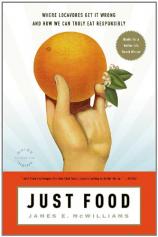Reading Group Guide
Discussion Questions
Just Food: Where Locavores Get It Wrong and How We Can Truly Eat Responsibly

1. Throughout Just Food, McWilliams suggests that the locavore and organic food movements are, to some extent, elitist. Do you agree?
2. How would you describe McWilliams’s stance toward the locavore movement? Do you fi nd him to be conciliatory? Combative? Did the book effectively convince you of his ideas?
3. Discuss some of the facts in Just Food that were most surprising to you. What assumptions had you previously held about how food is produced that made the information in the book so unexpected?
4. Do you think that your friends, family, or coworkers are aware of your food choices? Have you ever felt judged by a friend who believes his or her choices are more responsible than yours? Have you ever done the judging?
5. In chapter 2, “Organic Panic,” McWilliams quotes Nobel Peace Prize winner Norman Borlaug as saying, “If [environmentalists] lived just one month amid the misery of the developing world…they’d be crying out for tractors and fertilizerand irrigation canals and be outraged that fashionable elitists…were trying to deny them these things” (page 60). Imagine for a moment that you have just launched a nonprofi t organization with the goal of helping a developing country create a sustainable agriculture industry. What would your organization’s position be about the use of pesticides, GM seeds, inorganic fertilizers, industrial irrigation, and so forth? Would you encourage farmers to focus on producing staple foods, or on growing cash crops that could be exported for profit?
6. McWilliams argues that, in general, buying food from a supermarket is more energy efficient than visiting your local farmers’ market. But many people simply enjoy visiting farmers’ markets, and feel good about eating food purchased there. To what extent do you think personal happiness should be factored into our decisions about food? When scientific evidence points against choices that feel intuitively right or desirable to you, how do you decide what to do?
7. In chapter 3, McWilliams provides numerous reasons to support the wider use of genetically modified crops. However, he also states that he is opposed to some of the ways agribusiness currently exploits these crops. Do you agree with McWilliams’s positions about GM crops? If so, do you think it more important to support GM crops because of their environmental benefits, or to avoid them because big corporations profit from them?
8. Discuss your reaction to chapter 4, “Meat --- The New Caviar.” Do you agree with McWilliams that to consider oneself an ethical eater one must give up or drastically reduce meat consumption?
9. What was your response to McWilliams’s argument in chapter 5, “The Blue Revolution,” that aquaculture has a better chance of becoming a sustainable industry than livestock production does? What do you think would need to change in order for Americans to begin relying on fish, rather than meat and poultry, for the majority of their protein? Can you imagine yourself making this switch?
10. In chapter 6, “Merging Ecology and Economy,” McWilliams argues that perverse subsidies “actively and aggressively work against every proposal offered in this book” (page 190). However, if perverse subsidies are eliminated, some foods may become more expensive. Do you think Americans would be willing to pay higher prices for food? How much more would you be willing to pay for sustainably produced food?
11. Before you read Just Food, how did you decide which foods to eat? Did you try to eat mostly local, organic, or GM-free foods? Having read Just Food, do you plan to make any changes to your eating choices? If so, what do you expect will be the biggest challenges in making these changes?
Just Food: Where Locavores Get It Wrong and How We Can Truly Eat Responsibly
- Publication Date: June 9, 2010
- Paperback: 288 pages
- Publisher: Back Bay Books
- ISBN-10: 0316033758
- ISBN-13: 9780316033756







